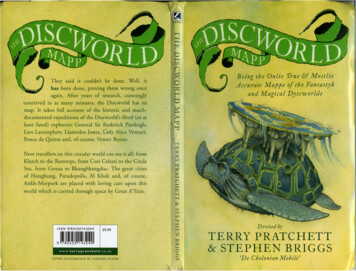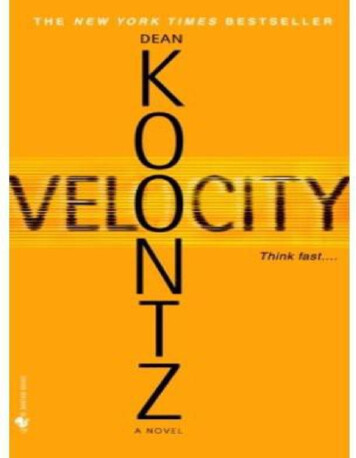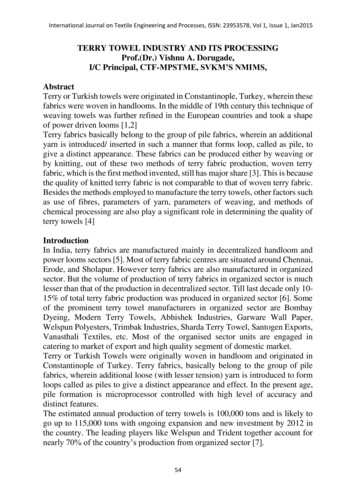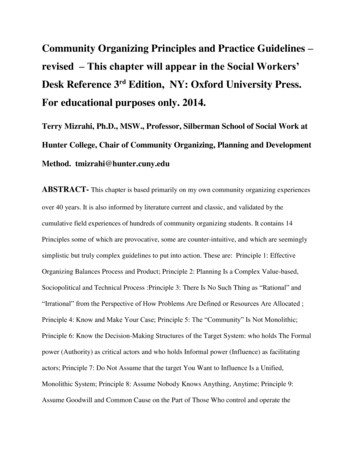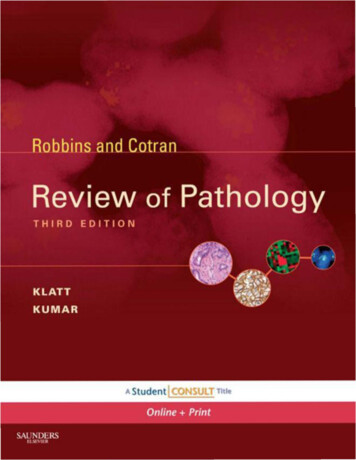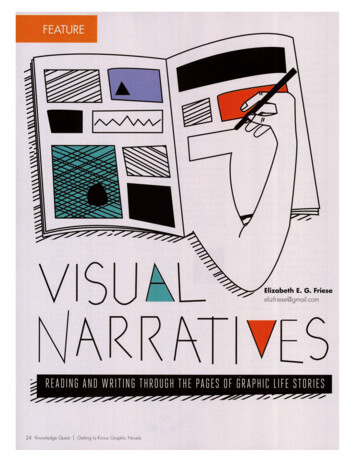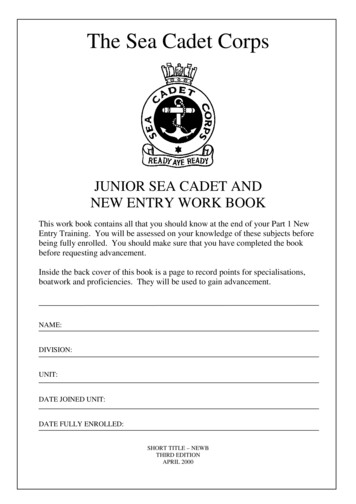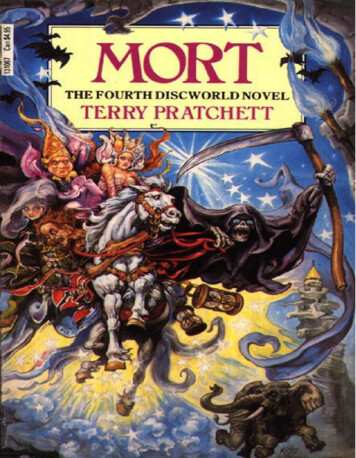
Transcription
Terry PratchettMortA Novel of Discworld
To Rhianna
ContentsBegin ReadingAbout the AuthorPraiseBooks by Terry PratchettCopyrightAbout the Publisher
Begin ReadingThis is the bright candlelit room where the life-timers arestored—shelf upon shelf of them, squat hourglasses,one for every living person, pouring their fine sand fromthe future into the past. The accumulated hiss of thefalling grains makes the room roar like the sea.This is the owner of the room, stalking through itwith a preoccupied air. His name is Death.But not any Death. This is the Death whoseparticular sphere of operations is, well, not a sphere atall, but the Discworld, which is flat and rides on theback of four giant elephants who stand on the shell ofthe enormous star turtle Great A’Tuin, and which isbounded by a waterfall that cascades endlessly intospace.
Scientists have calculated that the chance ofanything so patently absurd actually existing are millionsto one.But magicians have calculated that million-to-onechances crop up nine times out of ten.Death clicks across the black and white tiled flooron toes of bone, muttering inside his cowl as his skeletalfingers count along the rows of busy hourglasses.Finally he finds one that seems to satisfy him, lifts itcarefully from its shelf and carries it across to thenearest candle. He holds it so that the light glints off it,and stares at the little point of reflected brilliance.The steady gaze from those twinkling eye socketsencompasses the world turtle, sculling through thedeeps of space, carapace scarred by comets and pittedby meteors. One day even Great A’Tuin will die, Deathknows; now, that would be a challenge.But the focus of his gaze dives onwards towards
the blue-green magnificence of the Disc itself, turningslowly under its tiny orbiting sun.Now it curves away towards the great mountainrange called the Ramtops. The Ramtops are full of deepvalleys and unexpected crags and considerably moregeography than they know what to do with. They havetheir own peculiar weather, full of shrapnel rain andwhiplash winds and permanent thunderstorms. Somepeople say it’s all because the Ramtops are the home ofold, wild magic. Mind you, some people will sayanything.Death blinks, adjusts for depth of vision. Now hesees the grassy country on the turnwise slopes of themountains.Now he sees a particular hillside.Now he sees a field.Now he sees a boy, running.
Now he watches.Now, in a voice like lead slabs being dropped ongranite, he says: YES.
There was no doubt that there was something magical inthe soil of that hilly, broken area which—because of thestrange tint that it gave to the local flora—was knownas the octarine grass country. For example, it was oneof the few places on the Disc where plants producedreannual varieties.Reannuals are plants that grow backwards in time.You sow the seed this year and they grow last year.Mort’s family specialized in distilling the wine fromreannual grapes. These were very powerful and muchsought after by fortune-tellers, since of course theyenabled them to see the future. The only snag was thatyou got the hangover the morning before, and had todrink a lot to get over it.Reannual growers tended to be big, serious men,much given to introspection and close examination ofthe calendar. A farmer who neglects to sow ordinaryseeds only loses the crop, whereas anyone who forgetsto sow seeds of a crop that has already been harvested
twelve months before risks disturbing the entire fabric ofcausality, not to mention acute embarrassment.It was also acutely embarrassing to Mort’s familythat the youngest son was not at all serious and hadabout the same talent for horticulture that you wouldfind in a dead starfish. It wasn’t that he was unhelpful,but he had the kind of vague, cheerful helpfulness thatserious men soon learn to dread. There was somethinginfectious, possibly even fatal, about it. He was tall, redhaired and freckled, with the sort of body that seems tobe only marginally under its owner’s control; itappeared to have been built out of knees.On this particular day it was hurtling across thehigh fields, waving its hands and yelling.Mort’s father and uncle watched it disconsolatelyfrom the stone wall.“What I don’t understand,” said father Lezek, “isthat the birds don’t even fly away. I’d fly away, if I sawit coming towards me.”
“Ah. The human body’s a wonderful thing. I mean,his legs go all over the place but there’s a fair turn ofspeed there.”Mort reached the end of a furrow. An overfullwoodpigeon lurched slowly out of his way.“His heart’s in the right place, mind,” said Lezek,carefully.“Ah. ’Course, ’tis the rest of him that isn’t.”“He’s clean about the house. Doesn’t eat much,”said Lezek.“No, I can see that.”Lezek looked sideways at his brother, who wasstaring fixedly at the sky.“I did hear you’d got a place going up at yourfarm, Hamesh,” he said.
“Ah. Got an apprentice in, didn’t I?”“Ah,” said Lezek gloomily, “when was that, then?”“Yesterday,” said his brother, lying withrattlesnake speed. “All signed and sealed. Sorry. Look,I got nothing against young Mort, see, he’s as nice aboy as you could wish to meet, it’s just that—”“I know, I know,” said Lezek. “He couldn’t findhis arse with both hands.”They stared at the distant figure. It had fallen over.Some pigeons had waddled over to inspect it.“He’s not stupid, mind,” said Hamesh. “Not whatyou’d call stupid.”“There’s a brain there all right,” Lezek conceded.“Sometimes he starts thinking so hard you has to hit himround the head to get his attention. His granny taughthim to read, see. I reckon it overheated his mind.”
Mort had got up and tripped over his robe.“You ought to set him to a trade,” said Hamesh,reflectively. “The priesthood, maybe. Or wizardry. Theydo a lot of reading, wizards.”They looked at each other. Into both their mindsstole an inkling of what Mort might be capable of if hegot his well-meaning hands on a book of magic.“All right,” said Hamesh hurriedly. “Somethingelse, then. There must be lots of things he could turn hishand to.”“He starts thinking too much, that’s the trouble,”said Lezek. “Look at him now. You don’t think abouthow to scare birds, you just does it. A normal boy, Imean.”Hamesh scratched his chin thoughtfully.“It could be someone else’s problem,” he said.
Lezek’s expression did not alter, but there was asubtle change around his eyes.“How do you mean?” he said.“There’s the hiring fair at Sheepridge next week.You set him as a prentice, see, and his new master’llhave the job of knocking him into shape. ’Tis the law.Get him indentured, and ’tis binding.”Lezek looked across the field at his son, who wasexamining a rock.“I wouldn’t want anything to happen to him,mind,” he said doubtfully. “We’re quite fond of him, hismother and me. You get used to people.”“It’d be for his own good, you’ll see. Make a manof him.”“Ah. Well. There’s certainly plenty of rawmaterial,” sighed Lezek.
Mort was getting interested in the rock. It had curlyshells in it, relics of the early days of the world when theCreator had made creatures out of stone, no one knewwhy.Mort was interested in lots of things. Whypeople’s teeth fitted together so neatly, for example.He’d given that one a lot of thought. Then there was thepuzzle of why the sun came out during the day, insteadof at night when the light would come in useful. Heknew the standard explanation, which somehow didn’tseem satisfying.In short, Mort was one of those people who aremore dangerous than a bag full of rattlesnakes. He wasdetermined to discover the underlying logic behind theuniverse.Which was going to be hard, because there wasn’tone. The Creator had a lot of remarkably good ideaswhen he put the world together, but making itunderstandable hadn’t been one of them.
Tragic heroes always moan when the gods take aninterest in them, but it’s the people the gods ignore whoget the really tough deals.His father was yelling at him, as usual. Mort threwthe rock at a pigeon, which was almost too full to lurchout of the way, and wandered back across the field.
And that was why Mort and his father walked downthrough the mountains into Sheepridge on HogswatchEve, with Mort’s rather sparse possessions in a sack onthe back of a donkey. The town wasn’t much morethan four sides to a cobbled square, lined with shopsthat provided all the service industry of the farmingcommunity.After five minutes Mort came out of the tailor’swearing a loose fitting brown garment of imprecisefunction, which had been understandably unclaimed bya previous owner and had plenty of room for him togrow, on the assumption that he would grow into anineteen-legged elephant.His father regarded him critically.“Very nice,” he said, “for the money.”“It itches,” said Mort. “I think there’s things inhere with me.”“There’s thousands of lads in the world’d be very
thankful for a nice warm—” Lezek paused, and gave up—“garment like that, my lad.”“I could share it with them?” Mort said hopefully.“You’ve got to look smart,” said Lezek severely.“You’ve got to make an impression, stand out in thecrowd.”There was no doubt about it. He would. They setout among the throng crowding the square, eachlistening to his own thoughts. Usually Mort enjoyedvisiting the town, with its cosmopolitan atmosphere andstrange dialects from villages as far away as five, eventen miles, but this time he felt unpleasantly apprehensive,as if he could remember something that hadn’thappened yet.The fair seemed to work like this: men looking forwork stood in ragged lines in the center of the square.Many of them sported little symbols in their hats to tellthe world the kind of work they were trained in—shepherds wore a wisp of wool, carters a hank of
horsehair, interior decorators a strip of rather interestinghessian wallcovering, and so on.The boys seeking apprenticeships were clusteredon the Hub side of the square.“You just go and stand there, and someone comesand offers you an apprenticeship,” said Lezek, his voicetrimmed with uncertainty. “If they like the look of you,that is.”“How do they do that?” said Mort.“Well,” said Lezek, and paused. Hamesh hadn’texplained about this bit. He drew on his limitedknowledge of the marketplace, which was restricted tolivestock sales, and ventured, “I suppose they countyour teeth and that. And make sure you don’t wheezeand your feet are all right. I shouldn’t let on about thereading, it unsettles people.”“And then what?” said Mort.
“Then you go and learn a trade,” said Lezek.“What trade in particular?”“Well carpentry is a good one,” Lezekhazarded. “Or thievery. Someone’s got to do it.”Mort looked at his feet. He was a dutiful son,when he remembered, and if being an apprentice waswhat was expected of him then he was determined tobe a good one. Carpentry didn’t sound very promising,though—wood had a stubborn life of its own, and atendency to split. And official thieves were rare in theRamtops, where people weren’t rich enough to affordthem.“All right,” he said eventually, “I’ll go and give it atry. But what happens if I don’t get prenticed?”Lezek scratched his head.“I don’t know,” he said. “I expect you just waituntil the end of the fair. At midnight. I suppose.”
And now midnight approached.A light frost began to crisp the cobblestones. Inthe ornamental clock tower that overlooked the squarea couple of delicately-carved little automatons whirredout of trapdoors in the clockface and struck the quarterhour.Fifteen minutes to midnight. Mort shivered, but thecrimson fires of shame and stubbornness flared upinside him, hotter than the slopes of Hell. He blew onhis fingers for something to do and stared up at thefreezing sky, trying to avoid the stares of the fewstragglers among what remained of the fair.Most of the stallkeepers had packed up and gone.Even the hot meat pie man had stopped crying hiswares and, with no regard for personal safety, waseating one.The last of Mort’s fellow hopefuls had vanishedhours ago. He was a wall-eyed young man with a stoopand a running nose, and Sheepridge’s one licensed
beggar had pronounced him to be ideal material. Thelad on the other side of Mort had gone off to be atoymaker. One by one they had trooped off—themasons, the farriers, the assassins, the mercers,coopers, hoodwinkers and ploughmen. In a few minutesit would be the new year and a Hundred boys would bestarting out hopefully on their careers, new worthwhilelives of useful service rolling out in front of them.Mort wondered miserably why he hadn’t beenpicked. He’d tried to look respectable, and had lookedall prospective masters squarely in the eye to impressthem with his excellent nature and extremely likeablequalities. This didn’t seem to have the right effect.“Would you like a hot meat pie?” said his father.“No.”“He’s selling them cheap.”“No. Thank you.”
“Oh.”Lezek hesitated.“I could ask the man if he wants an apprentice,”he said, helpfully. “Very reliable, the catering trade.”“I don’t think he does,” said Mort.“No, probably not,” said Lezek. “Bit of a oneman business, I expect. He’s gone now, anyway. Tellyou what, I’ll save you a bit of mine.”“I don’t actually feel very hungry, Dad.”“There’s hardly any gristle.”“No. But thanks all the same.”“Oh.” Lezek deflated a little. He danced about abit to stamp some life back into his feet, and whistled afew tuneless bars between his teeth. He felt he ought tosay something, to offer some kind of advice, to point
out that life had its ups and downs, to put his armaround his son’s shoulder and talk expansively aboutthe problems of growing up, to indicate—in short—thatthe world is a funny old place where one should never,metaphorically speaking, be so proud as to turn downthe offer of a perfectly good hot meat pie.They were alone now. The frost, the last one ofthe year, tightened its grip on the stones.High in the tower above them a cogged wheelwent clonk, tripped a lever, released a ratchet and let ahe
all, but the Discworld, which is flat and rides on the back of four giant elephants who stand on the shell of the enormous star turtle Great A’Tuin, and which is bounded by a waterfall that cascades endlessly into space. Scientists have calculated that the chance of anything so patently absurd actually existing are millions to one. But magicians have calculated that million-to-one chances .
